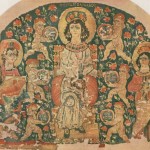In my previous article “7 things I wish people knew about Wicca“, I wrote a section about “black witchcraft” versus “white witchcraft”. It is one of those topics that is not easily dealt with in a quick soundbite, and this quickly became apparent from the comments.
I also realise that the headline of that section (There is no such thing as ‘black witchcraft’ or ‘white witchcraft’) was ambivalent. What I meant was that there isn’t a whole movement of people who consider themselves to be “black witches” or “white witches“, not that there is no such thing as “black magic” or “white magic“, although I do consider those terms to be very very unhelpful for a number of reasons.
Besides, as everyone knows, the colour of magic is octarine.
“It was octarine, the colour of magic. It was alive and glowing and vibrant and it was the undisputed pigment of the imagination, because wherever it appeared it was a sign that mere matter was a servant of the powers of the magical mind. It was enchantment itself.
But Rincewind always thought it looked a sort of greenish-purple.”
There are of course Black people who are witches and/or Wiccans, and that is one of the reasons I object to the use of the term “black” to mean maleficent. If you say “there are no black witches” (meaning “there are no 100% maleficent witches”) it sounds like you are saying “there are no Black witches” (meaning “there are no Black people who are witches”, which is obviously not true). Furthermore, associating black with evil is unhelpful, as it may reinforce racist assumptions about Black people.
I am not denying that magic can be used for bad or selfish purposes, or even that it can be used to call upon entities with a less than benevolent agenda. I would deny that the entities called upon are the source of the magic, however. The universe is the source of the magic. However, people cannot be divided up neatly into “black witches” and “white witches”, and there is no cosmic force of evil or cosmic force of good in the Pagan worldview. There are no personifications of good and evil in Wicca, but there are personifications of destruction, disorder, etc. (Loki, Kali, Eris, etc.), but these are regarded as part of the natural cycle: agents of chaos or destruction, bringing change so that renewal may take place. There are also personifications of growth, life, and light to balance the agents of chaos and destruction. And Wiccans are strongly discouraged from using magic for bad purposes. Therefore the question “are you a black witch or a white witch?” is redundant.
I believe that the same energy underlies all magic, and that energy is a natural property of the universe – or perhaps preternatural. In my view (which as far as I know is agreed upon by a large number of Wiccans and other magical folk), magic exists independently of those who wield it, whether they are human or spirit. Magic is a bit like the Force in Star Wars – which was actually based on the concept of the Tao, or possibly on ch’i (which are of course not equivalent to each other).
Magic, and spiritual beings, are agreed upon by most Pagans to be immanent in the universe, intertwined with matter – not outside and beyond the universe. if there is an Otherworld or spirit realm, it is usually seen as very close to, or intertwined with, the physical realm. As Michael York writes:
The supernatural as we know it is largely a Christian-derived expression from the idea that its ‘God’ is over and ‘above’ nature – material/empirical reality. It is this notion that is the target of secular and naturalistic animosity alike. Instead, rather than ‘supernatural’, I turn instead to the ‘preternatural’ that expresses the non-causal otherness of nature – one that comprehends the magical, miraculous, numinous, mysterious yet non-empirical quality of the sublime. Most important, however, the preternatural does not demand belief or faith but instead encounter and experience – whether through contemplation, metaphor, spontaneous insight, ecstasy, trance, synchronicity or ritual or any combination of these. As Margot Adler expressed it, paganism is not about belief but what we do.
Yes, magic can be used to call upon entities such as gods and spirits (who may be preternatural or supernatural depending on your theological perspective), but why would you call upon an entity that you consider to have a negative or maleficent agenda? Of course, there are people who work with entities who are labelled as demons, but I’m pretty sure those people would defend their magical work and the entities as benevolent or at the very least, just misunderstood.
As to the possibly malevolent or beneficent agenda of magical entities: surely that depends on your perspective? Some entities may be hostile to humans, because we are busy despoiling the planet and making other species extinct. From the perspective of those other species, humans are evil (even those of us who are not actively going out and killing endangered species are complicit in the habitat loss and pollution that is making many species extinct). Some entities may be entirely indifferent to humans, and not notice that they are trampling on us. The hurricane and the volcano and the venomous spider don’t intend to kill people; they just do.
I am aware that there are people who use magic for selfish or even maleficent purposes; but Wiccans are taught that this is a bad idea, because there are negative consequences. A person who consistently acts only in their own interest will hurt other people, and eventually hurt themselves.
I believe that morality and ethics are much more complex and contextual than a simple black/white dichotomy. For example, if someone was to curse a dictator such as Stalin or a mass murderer like Pol Pot, would that be “black magic” or “white magic”? Or if I give healing (normally considered “white magic”) to someone who then goes on to commit a very evil act, was my healing “white magic” or “black magic”?
Magic is a bit like a tool: it can be wielded for good or bad purposes. As Lori Ann James commented on my previous post:
The intent of the magic-wielder, and the consequences of the magic, and the intentions of any magical allies who helped with the work, all contribute to the benevolence or malevolence of the magic. So, until all the consequences have played themselves out, and until all the motives have been weighed and analysed, it is a bit difficult to tell whether it was good magic or bad magic. As in the story of the Taoist farmer, the consequences of many actions or events are hard to classify as wholly good or wholly bad.
The problem is, when someone asks “are you a black witch or a white witch”, they are not looking for a long explanation of the Pagan worldview, or Wiccan morality and ethics. They are looking for a quick soundbite; they probably want you to say “a white witch, of course”. But it is an ignorant question in so many ways, and one to which there is no simple and straightforward answer. That’s why I tend to reply with “I am a green witch” or “your question makes no sense in my paradigm” because otherwise one ends up reinforcing a simple binary view of morality and people as neatly divided up into “good people” and “bad people”, or “good actions” and “bad actions”.
![Starry Night, VVincent van Gogh [Public domain], via Wikimedia Commons](https://wp-media.patheos.com/blogs/sites/311/2015/07/Van_Gogh_-_Starry_Night_Google_Art_Project-300x237.jpg)
In Wicca, darkness does not symbolise evil. The darkness is necessary for rest, growth, and regeneration. Death is not evil, but a necessary adjunct to life. If there was no death and dissolution, there could be no change or growth. The cycle of birth, life, death, and rebirth is part of the interaction of the polarities. Suffering is also part of the process of growth; just as a tree is shaped by the wind, we are shaped by our experiences. It is only by experiencing suffering that we acquire sufficient depth to know the fullness of joy. It is then that the full light of consciousness dawns in us, and we achieve mystical communion with the divine/deities.
So, if someone asks you “are you a white witch or a black witch?” how do you answer the question?
















